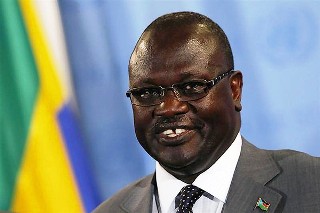Vice-president says federal system best for governing South Sudan
June 4, 2013 (JUBA) – Federalism is the best system of governance for South Sudan, said the country’s vice-president, Riek Machar, who further advocated for creation of more states in the country.

Federal system, unlike mere decentralisation, is a constitutional arrangement in which the sovereignty of the nation is divided between the national and state governments and provides for a stronger degree of autonomy to various levels of government including fiscal, administrative and political aspects of governance.
The current decentralised system in South Sudan, to a certain degree, has focused on political autonomy ignoring the administrative and fiscal aspects that are addressed in a federal arrangement.
Machar in various public occasions this week said an empowered federal system would provide autonomous powers and encourage the sense of accountability in the various levels of government, adding it would also help remove the fears of marginalization and promote nationalism and unity among the 65 diverse tribes of South Sudan.
He also said the principle of taking towns to the people by the ruling party, SPLM, can be realized through creation of more administrative units.
The 10 states were established in 1993 by the current regime in Khartoum under president Omer Hassan Al-Bashir, but Machar said it would be necessary to create more states and counties for better service delivery.
The country’s Vice President, also deputy chairman of the ruling SPLM, further suggested it would be possible to transform the former 22 old districts, established under the British colonial administration, into new states to serve the purpose.
South Sudan with the territory equivalent to the size of Uganda, Kenya and Tanzania combined, the region’s 10 states currently have 79 counties (districts) in total but Machar advocated that these should be increased to over 170.
Advocating for urbanisation of the rural populations, he added that a better way to achieve this is by creating more administrative units and assemble populations in such new centres or towns closer to the people, in order to provide them with basic services and road connectivity.
By so doing he said this would also provide space for the government to establish ranch-lands and dairy farms for the region’s 31 million cattle as well as gazette sufficient lands for huge agricultural schemes in the rural setup.
Federalism also provides the spirit of healthy competitions between states and encourages proper management of states’ respective resources including development of human resources.
As a federalist, the vice-president believes that the proliferation of decision-making units at state and local levels can strengthen public policy-making and encourage creative solutions to tough challenges.
(ST)
